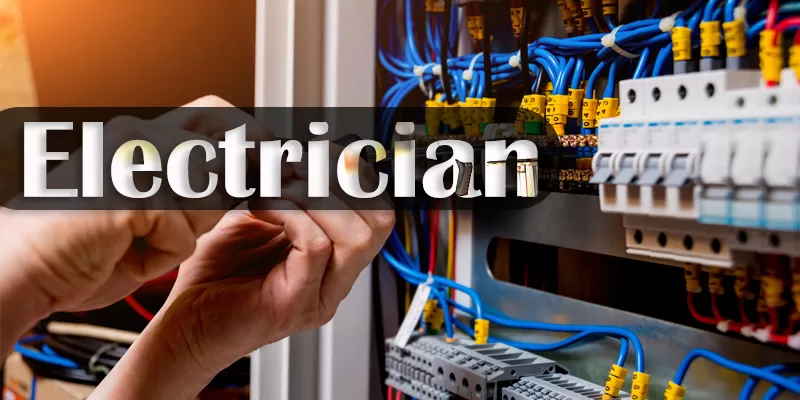
⚡ ITI Trade: Electrician
Powered by NCVT
The ITI Electrician Trade, under the National Council for Vocational Training (NCVT), is a highly job-oriented and skill-based program, tailored to meet the needs of both government and private sectors, as well as international industries. This course empowers trainees with the technical skills necessary for employment, self-employment, and entrepreneurial ventures in the electrical field.
✅ Why Choose ITI Electrician?
- Wide Employability Scope: From self-employment to contractual and industrial jobs, the opportunities are abundant.
- Government & Private Sector Jobs: Eligible for positions in Defence, Railways, Transport, Electricity Boards, Ship Building, Manufacturing Plants, and many more.
- Entrepreneurship & Self-Empowerment: Graduates can establish their own businesses, such as electrical appliance service centers, motor winding workshops, or work as licensed electrical contractors.
- Designed for Industry Needs: The curriculum is aligned with the current industrial demands of both Indian and global employers.
🔧 Career Pathways After ITI Electrician
After successful completion of this course, students are equipped to take on various roles, such as:
- Electrical Contractor (Eligible for a “B” Licence from the Electrical Licence Board)
- Electrical Motor Winder
- Service & Maintenance Technician (Domestic Appliances)
- Industrial and Domestic Wiring Contractor
- Armature Winder (Fans & Motors)
- Electrical Appliance Repair Technician
- Control Gear Assembler
- Technician in Defence, Railways, and Ship Building
- Installation and Testing Technician (Auditoriums, Cinema Halls)
- Line Man and Technician (Electricity Board / Power Companies)
- Telephone Line Technician (Telecom Departments)
- Instructor in Govt./Private ITIs/ITCs
- Merchant Navy Technician
- Technician in Indian Air Force
- Self-Employed Electrician or Contractor
🔋 Key Skills Acquired
- Electrical Wiring (Domestic, Industrial & Commercial)
- Repair and Maintenance of Electrical Appliances & Equipment
- Motor Winding & Generator Maintenance
- Operation & Maintenance of Electrical Machines and Transformers
- Installation of Lighting Systems in Factories, Offices, and Homes
- Electrical Testing and Troubleshooting
- Knowledge of Renewable Energy Basics (Solar Installations)
- Safety Procedures and Regulations in Electrical Work
- Proficiency in Modern Tools and Measuring Instruments
🌟 Future Prospects
- Higher Education & Certifications: Students can pursue advanced certifications, Diploma or Engineering degrees in Electrical Engineering for career advancement.
- Government Jobs: Opportunities in Railways, Defence Services, Electricity Boards, and Public Sector Undertakings (PSUs).
- Private Sector Employment: Roles in Construction Companies, Manufacturing Plants, Facility Management, Maintenance Companies, and Renewable Energy Firms.
🛠️ Be Industry-Ready!
This course ensures practical training with hands-on experience, making students job-ready for industrial sectors, government organizations, and entrepreneurship.
✅ Learning Outcomes – ITI Electrician Trade
After successful completion of the ITI Electrician course, trainees will be equipped with comprehensive knowledge and skills applicable to various electrical and electronics jobs. Below are the broad learning outcomes expected from the course:
⚙️ Core Technical Skills
- Apply safe working practices at all times.
- Comply with environmental regulations and ensure proper housekeeping in the workplace.
- Prepare profiles with appropriate accuracy as per engineering drawings.
- Prepare electrical wire joints, perform soldering, crimping, and measure insulation resistance of underground cables.
- Verify characteristics of both electrical and magnetic circuits.
- Install, test, and maintain batteries and solar cells.
- Estimate, assemble, install, and test electrical wiring systems for various applications.
- Plan and prepare earthing installations ensuring safety and compliance.
- Plan and execute electrical illumination systems and perform functional testing.
- Perform testing, detect errors, and calibrate measuring instruments.
- Plan, install, troubleshoot, and repair domestic appliances.
- Execute testing, evaluate performance, and perform maintenance on transformers.
- Execute testing and maintenance on DC machines and motor starters.
- Plan, commission, and evaluate performance of DC machines.
- Identify, organize, and perform motor winding techniques.
- Plan, commission, and evaluate performance of AC motors.
- Execute testing and maintenance of AC motors and starters.
- Plan, test, evaluate performance, and carry out maintenance of alternators/MG sets.
- Perform parallel operation of alternators for load sharing.
- Assemble simple electronic circuits and test their functionality.
- Assemble accessories and carry out wiring of control cabinets and equipment panels.
- Perform speed control of AC and DC motors using solid-state devices.
- Detect faults and troubleshoot power electronic devices like inverters, stabilizers, battery chargers, emergency lights, and UPS systems.
- Erect overhead domestic service lines and understand various power plant layouts.
- Examine faults and carry out repairs on different types of circuit breakers.
- Plan, assemble, and install solar panels, ensuring efficiency and safety.
🧠 General and Employability Skills
- Interpret and use technical communication in the workplace.
- Demonstrate knowledge of basic arithmetic, algebra, trigonometry, and statistics and apply them in electrical practices.
- Understand and explain basic science concepts such as friction, simple machines, heat, and temperature, and their application in the field.
- Read and interpret engineering drawings for various electrical and mechanical applications.
- Understand and apply productivity concepts, quality tools, and labour welfare legislation in the workplace to improve efficiency and compliance.
- Explain and practice energy conservation, recognize the impact of global warming and pollution, and optimize resource usage.
- Understand personal finance, entrepreneurship, and manage tasks to support personal and societal growth.
- Understand and operate basic computer systems, use operating systems, and utilize internet services to leverage IT advancements in the electrical industry.
